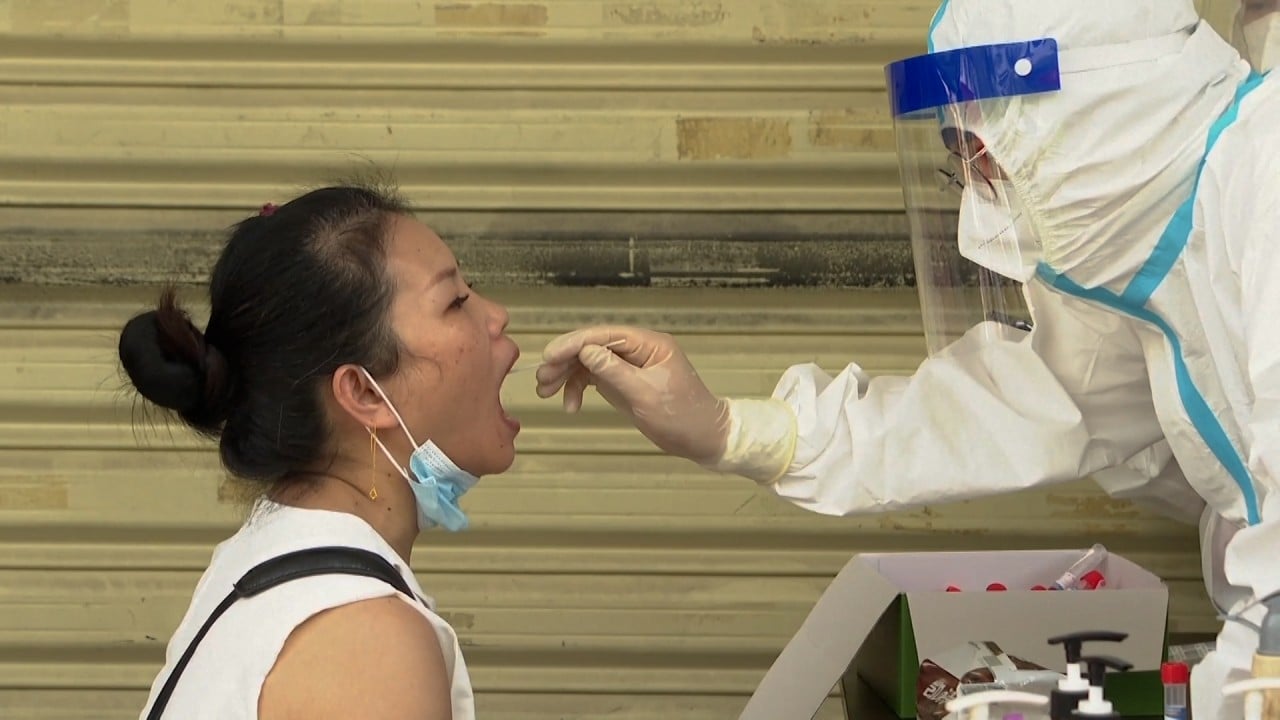
China’s Covid-19 outbreak in Fujian shows signs of slowing
- Smallest growth in new cases ties in with researchers’ prediction of imminent plateau
- Alleged first case voices distress over online and real life attacks on family, even as government scientist suggests quarantine infection may be to blame
Thirty-one Covid-19 cases were reported on Friday, including 21 from Putian, eight from Xiamen and two from Zhangzhou, bringing total infections to 295 in eight days.
The number included those who tested positive but had yet to show symptoms. Six cases were recorded as positive for Covid-19 after they turned symptomatic, the National Health Commission said on Saturday.

01:39
China’s Delta variant outbreak in Fujian surges as Covid-19 cases hit 165 in a week
Researchers at The Global Covid-19 Prediction System, under the College of Atmospheric Sciences at Lanzhou University, had previously said the epidemic in Putian would peak around September 16 and, with asymptomatic cases being picked out in citywide tests, the outbreak would plateau.
Their latest prediction on Friday said the epidemic in Xiamen would be contained within 10 days with final confirmed Covid-19 cases to be kept under 200 if strict control measures were still in place.

03:05
Ancient city of Xian takes extensive measures to protect China’s National Games from Covid-19
Huang Senzhong, a professor at Nankai University, told People’s Daily that the overall trend was positive, but while there were grounds for cautious optimism, it was necessary to guard against a relapse.
Huang’s team estimate infections will be brought under control some time between September 30 and October 3 and “ideally by National Day” on October 1.
“Now is not the time to let down our guard,” Huang said. “The emergence of Covid-19 in Zhangzhou on Thursday suggests that the epidemic could go ‘off track’ next week, meaning that a large relapse might disrupt the original trend.”
Meanwhile, the alleged first patient in the current Covid-19 outbreak said his personal information had been leaked, and his family was being attacked online and in real life.
The man, identified only by his family name Lin and part of his first name, was believed to be the source of the wave of infections after his 12-year-old son tested positive in a school sample testing drive on September 10.
Singapore’s Chinese embassy says ‘dozens’ of nationals caught Covid-19 there
Lin returned from Singapore on August 4 and underwent 21 days of quarantine, testing negative nine times for the coronavirus and also in three serology tests for antibodies.
“I cannot understand why, after testing so many times and being in quarantine for so many days, I suddenly tested positive again, and less than two days after being in quarantine again, the test result was negative once again,” Lin wrote on Weibo. “Now everyone is scolding me and I myself am very aggrieved.”
He said information about him and his family had been leaked online and the whole family was being subjected to online violence.
No one wants to be a confirmed case, and no one wants to be an infected person. We are also victims of the resurgence of the epidemic.
“We were abused and cursed by many people, which caused uncontrollable fear and stress to my entire family,” he wrote. “No one wants to be a confirmed case, and no one wants to be an infected person. We are also victims of the resurgence of the epidemic.”
He was quarantined for 14 days at a hotel in Xiamen after arriving in China, another seven days at a hotel in Xianyou county and then sent back home, where he stayed a further 10 days under self-quarantine on the advice of the local government, Lin said in a statement posted on social media Weibo.
Then he was tested again on September 10 after his son tested positive, and one of the two tests came back positive.
Two days later, his whole family tested negative, he wrote.
Delta outbreak in Fujian puts more than 50 children in hospital isolation
In the government statement at the beginning of the outbreak, Lin was described as a possible source of infection for returning from overseas.
But Wang Huaqing, chief immunisation scientist with the Chinese Centre for Disease Control and Prevention, said he might have been infected during quarantine.
“Based on epidemiological investigations and laboratory tests, particularly sequencing results, it is now believed that the first case of the outbreak may have been infected during a period of centralised isolation, which led to the subsequent outbreak,” Wang said in a media briefing on Thursday.

